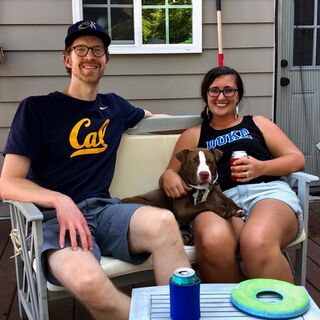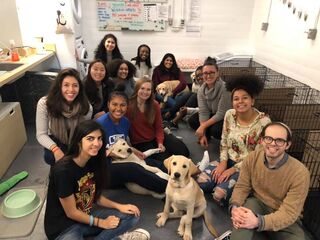
Bias
I Got a Pandemic Dog That Also Helps Me Process Racism
The science behind how dogs help us cope.
Posted June 1, 2020

Yesterday, a man walked up to me and said, “Is this a pandemic dog?” At first, I was offended—he didn’t really say hello, he didn’t introduce himself, and I didn’t think of my new adorable family member as just a “pandemic dog.” He just looked at me and my 6-month-old pit/lab mix, Archie, and assumed I was just as trendy as everyone else.
And yes, dog adoptions have been at an all-time high during COVID. Organizations like the ASPCA in the U.S. reported a 400 percent increase in foster and adoptions in the Los Angeles and NYC areas alone, and Australia showed a 300 percent increase. Sure, call me trendy. But throughout COVID, we have all gained and lost various identities that have impacted us all in unfathomable ways—from the loss of a family member to the loss of employment, these are just some of the issues that people have been facing the past few months. And we are all still learning to adapt and cope as our world continues to shift.
I have been so incredibly privileged during this time to still be employed, to own a home, and to have space in which to stay-at-home safely. I know that my own coping was really nothing in comparison to the average person. But choosing to rescue a dog and gaining this new identity as a “Dog Mom” really gave me a new sense of purpose and happiness.
But this past week, happiness was hard to see in the world. On the murder of George Floyd in Minneapolis, and the assault on Christian Cooper in Central Park, New York, I have no words to truly capture how I feel. I am angry, I am sad, and at the same time, I am not surprised since our system is incredibly flawed. George Floyd said out loud to four police officers that he could not breathe for multiple minutes, and they could not have cared any less because of the color of his skin. Christian Cooper was just trying to go birding, but another White person found him aggressive simply because of the color of his skin.
Being Biracial Black/White but passing as White, I know the other privilege I walk around with every day—the color of my own skin. I can even wear a COVID mask without extra judgment. Social media is now flooded with racially divided coverage and interpretations of the riots. As Martin Luther King said in “The Other America” in 1968, “Riots are the language of the unheard.” COVID was already disproportionately killing more Black people than other races in the U.S., and this past week served as a reminder that the diseases known as racism and white supremacy are still very much alive and well.
That’s why so many people are rioting. That’s why so many people are angry. This disease has persisted across the history of the U.S., and the Black community remains unheard. As rapper Killer Mike said during a protest in Atlanta, “It is the responsibility of us to make this better right now. We don’t want to see one officer charged. We want to see four officers prosecuted and sentenced. We don’t want to see Targets burning. We want to see the system that sets up for systemic racism burnt to the ground.”
How does having a dog help me cope with racism? Simple. I get to start each morning with that wagging tail, with my 40-pound puppy pretending he is a lap dog when he never quite fits but keeps trying anyway, when he snuggles next to me on the couch and then proceeds to share his little puppy snore during nap time, or when he gives me that one little dog kiss out of nowhere just to show his unconditional love. It is that little dog cuddle of a reminder that every day there is something positive somewhere, even if it might be hard to find at first. That encounter gives me hope for the new day. It allows me to reset, reprocess, strategize, and work.
And The National Institutes of Health affirms that having a dog decreases the levels of various stress-related hormones, lowers your blood pressure, reduces feelings of loneliness, and boosts your mood. From that same article, Dr. Ann Berger, a researcher at the NIH Clinical Center in Bethesda, Maryland, said, “Dogs are very present. If someone is struggling with something, they know how to sit there and be loving. Their attention is focused on the person all the time.”

And here at Duke University, Dr. Brian Hare, a canine cognition researcher and Evolutionary Anthropology professor, was quoted saying:
“He [our dog] gets us out on walks, makes us play and hug, is always happy to see us, and finally makes us feel good just by needing us. We know that for many people dogs can be a powerful way to reduce stress and anxiety. For some, a dog becomes one of the most important, if not most important, social relationships. This is common in older individuals who have the greatest need to physically distance themselves [during COVID]. Their dog is a place of security, solace, and love. These dogs are essential citizens right now.”
Archie, I want to end this blog by saying thank you for helping me find a little bit of happiness each day. You and your canine friends all over the world, I know, are doing the same, and you are the citizens that will help keep some hope alive.



